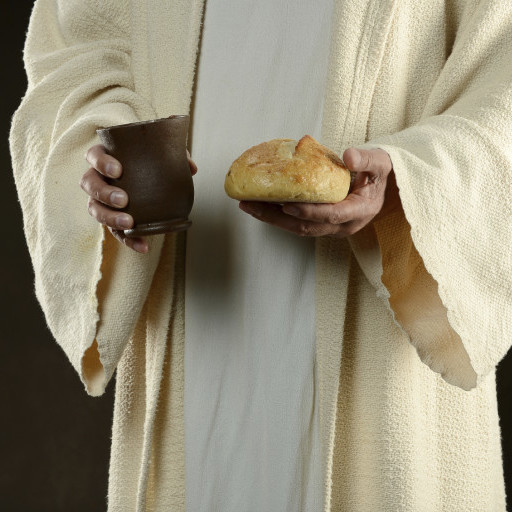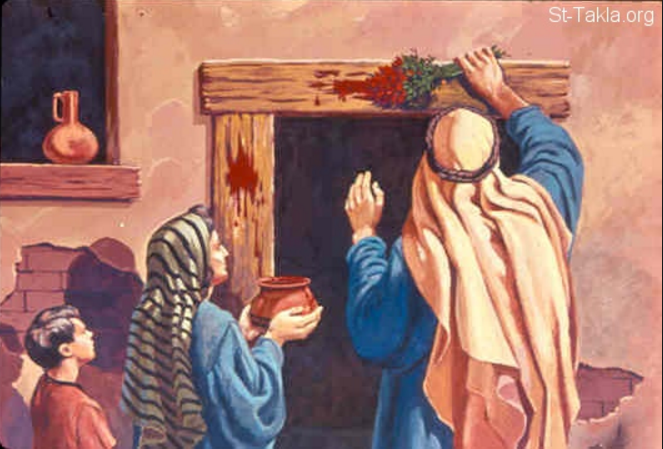In the Sacrament prayer, we find the name of the Savior, Jesus Christ. Christ is a Biblical Greek word transliterated into English. Originally in Hebrew, the word was Messiah. The Hebrew meaning of the word Messiah means the anointed man. The root verb from which the noun is made literally means to smear grease, oil or paint onto something. Who were those who were anointed in the Old and New Testament. They were prophets, priests and kings. Aaron was anointed a High Priest by Moses, Elisha was anointed a prophet by Elijah, and Saul and David were anointed Kings by Samuel the prophet. The word messiah is found 29 times in the Old Testament. During one of those times it is preceded by Yeshua or Joshua. So the direct translation is Joshua the anointed one, but the modern transliterated meaning would be Jesus the Messiah.
Several prophets in the Old Testament were symbolic types of the future Messiah: Abraham and Moses. Abraham’s life is summarized in an Isaiah prophecy about the Messiah: Isaiah 9:6: “For to us a child is born, to us a son is given, and the government will be on his shoulders. And he will be called Wonderful Counselor, Mighty God, Everlasting Father, Prince of Peace.” He was the father of nations yet to be born and now it is said by some scholars that 95% of the world’s population is descended from Abraham. So the title, everlasting father fits him well as it does the future Messiah. He was a prince of peace, creating peace in Haran where he converted many souls, and then in Palestine where he ensured the safety and peace of his people. Indeed, as a king of kings he lead the group of Kings in the rescue of Lot. So the government was upon his shoulder. He was a counselor to his people.
Moses blessed the people with Manna from heaven to eat just as Jesus would later multiply the loaves and fish in feeding the 5,000. Jesus said He was the bread of life. Moses struck the rock and out flowed water to feed the thirsty Israelites in the desert. Jesus said that He was the living water that whosever would drink of it would never thirst. Jesus was the rock rejected by the builders upon which whosever would build would never fall. He is the rock of our salvation and when the winds of adversity and suffering come into our lives as they always seem to do, we are not moved or washed away as those built on sand. Later Moses would lift up the serpent on the staff, the modern-day symbol of doctors—the Caduceus, that whosoever would look on it would be healed. Likewise, Jesus Christ would be lifted up on the Cross, and whosever believed on Him would have eternal life. And as Jesus was lifted up, so would He have power to draw all men to Him.
Since Jesus’ role as Messiah would be an active role, one must investigate more the root verb that underlies the noun Messiach in Hebrew. The act of smearing has its most memorable Biblical occurrence in the smearing of the Lamb’s blood on the door posts in Egypt during that first dark night of Passover. The door imagery is quite meaningful in Ancient Hebrew and throughout the scriptures.
In ancient pictographic, paleo-Hebrew, the letter “D” means door. Teaching the alphabet to children in ancient times meant teaching the gospel of Jesus Christ in all its purity. The name of God “El” meant strong and might leader who governs gently with a shepherd’s staff. Alpha and Omega meant the strong and mighty leader on the cross. The letter “M” in the ancient Hebrew word for mother meant the many waters, the waters of birth and baptism, the watery sticky hide soup that became their glue symbolizing the glue that held the family together, the mother. Each letter does this story with many layers of meaning and many overlapping stories. Put two or three letters together and the function, or active force of the verb is told through many stories.
The letter “B” meant house or tent. Originally it looked like a Hebrew nomadic shepherd’s tent. It is in the first word in the Hebrew bible meaning to create. Representing home, tabernacle and the heavenly home of God, the Father it imbues every word it is in with the fullness of the comfort, love, protection, and caring that would be in a humble shepherd’s dwelling place.
So we now arrive back at “D”, the gate to the “B”, the shepherd’s tent. The image is heartwarming and comforting, with the ancient patriarch, like Abraham, sitting in the door of the tent and welcoming the three angels in who would bless him and Sarah and all of us his posterity forever. The father sits in the door of the tent. Behind him are two compartments just like our letter “B” has two rooms in the actual symbol. One is for his wife and daughters, and the other is for the young men. The father judges and governs all those who come in at the door. He decides who comes in and who is kept out. He has a watchful eye on the women and children protected by His presence. He looks out over his fields and flocks from his door and sees the servants working and governs their activities with the gentle shepherd’s staff.
With the blood smeared on the door posts in the Egyptian Passover, a new meaning was being attached to the door imagery taught to ancient Hebrews. Not only would the father protect those within, but the blood of the lamb, the Savior of the world, would also protect and save them from death, from the destroying angel, but also Satan himself, and all that is evil and destructive to the soul.
The modern father in Israel, protects his home from evil by keeping out, not letting in the door, pornography, bad movies, drugs, alcohol, evil people who would lead astray or destroy his family. He also protects his family by letting in modern angels, like the home teachers, Bishopric, visiting teachers, Primary, Young Women and Quorum leaders. He brings in the church magazines and church videos and uplifting programs.
And by magnifying his priesthood and temple covenants, he keeps the blood of the lamb on his door posts, pointing the way to each family members’ salvation through faith in Christ, and His atonement and gospel.
Nowhere in the scriptures is the gate imagery more beautiful than in the Book of Mormon. In 2 Nephi 9:41 we read:
the keeper of the gate is the Holy One of Israel; and he employeth no servant there; and there is none other way save it be by the gate; for he cannot be deceived, for the Lord God is his name.
In Helaman 3:28 we read
Yea, thus we see that the gate of heaven is open unto all, even to those who will believe on the name of Jesus Christ, who is the Son of God.
In Genesis 28:17 we read what Jacob said after his encounter with the angel:
And he was afraid, and said, How dreadful is this place! this is none other but the house of God, and this is the gate of heaven.
Now we see some of the beautiful imagery of the blood smeared on the door/gate of the keepers of the orginal Passover. Smearing is the root word for the noun, Messiach, in Hebrew. He is not only the holy anointed prophet priest and king, He is the blood smeared gate of heaven where He only is the shepherd keeper of the gate and the righteous judge who lets in His humble obedient disciples.

